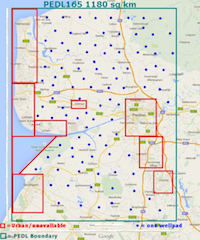Peter Lilley doesn’t exactly shine
In an interview with Radio 5 live in which he was “debating” the goings on at Balcombe with Vanessa Vine of Frack Free Sussex, Peter Lilley repeatedly stated that nearly 200 wells have been fracked in the UK already and that this technique had been going on for decades without problems.
This is of course a new variation on Cuadrilla’s theme of Elswick. Cuadrilla are fond of implying that the drilling at Elswick back in 1993, where they used just 162 cubic metres (m3) of fluid in a vertical well, is somehow representative of what is proposed on the high volume multi lateral fracking pads they propose no,w which would need nearly 20,000 m3 per well. (Regular readers will recall that this claim was censured by the ASA for being misleading and an exaggeration)
By way of context if the GWPF’s estimate that a modern frack job requires 19,000 m3 of fluid is accurate, then every single 40 well pad would need as much fluid for fracking as 4,691 Elswick fracks. They would need not just 1 of these pads but over 100 in the Fylde alone. That would be nearly half a million Elswicks! (Maybe we should use an “Elswick” as a new unit of measure in this debate?)
This rather puts the “we’ve already fracked 200 wells in the UK without a problem” line into context doesn’t it? Mr Lilleys’ suggestion is like saying to somebody “We’ve had corner shops on our streets for decades so why are you objecting to them building a 100,000 square foot Tesco next to your house?
This new claim about 200 wells seems to be based on comments made in the Daily Telegraph by Peter Style, Professor in Applied and Environmental Geophysics at Keele University, who said that fracking first happened in the UK in Lincolnshire in 1988. Referring to reported fracking at Wytch Farm in Dorset, now owned by Perenco, the article goes on to say “Perenco refused to give details of fracking at Wytch Farm but admitted that hydraulic fracturing happened at the oilfield after it was highlighted in a Royal Society report.”
When challenged that it was not true that this was the same technology as that which would be used Mr Lilley asked repeatedly what the differences between these wells and those now proposed by Cuadrilla are. Maybe he doesn’t actually know?
Perhaps he wouldn’t have needed to ask the question had he just read to the end of the Telegraph article, which seems first to have raised this issue of the 200 fracked wells in the UK, last week.
Here he could have read:
Richard Davies, Professor of Energy at Durham University, agreed fracking has been going on in the UK for decades. He said the risk is fracking for shale gas. “The oil industry is correct in saying they have been fracking for some time. What is new is the widespread deployment and possible fracking for shale gas.”
Prof Davies explained that unlike fracking for conventional oil and gas, fracking for shale gas requires multiple wells and has only happened in Lancashire so far, where it caused a small earthquake. Durham University has published peer-reviewed papers explaining that earthquakes and contamination of aquifers are unlikely with this sort of fracking. However he did say that it could cause the “industrialisation” of the countryside because of the number of wells and the traffic.
Prof Davies might also ahve mentioned the huge difference in the amount of fluid and pressurisation required by high volume horizontal fracking with its knock on effects in terms of traffic and noise, light, atmospheric and environmental pollution. He didn’t, but Ms Vine did.
When Ms Vine explained that people were having problems in the village like discoloured water in the taps as a result of Cuadrilla’s activities, Mr Lilley then asked incredulously “…before they’ve even drilled?”. As anyone who is remotely interested in this subject knows that drilling has been going on for some time we can only conclude that Mr Lilley is incredible badly informed about what has been going on in the last week.
Ms Vine’s reaction “You so don’t know what you are talking about” certainly showed what she thought.
The interview can be heard by clicking this link































